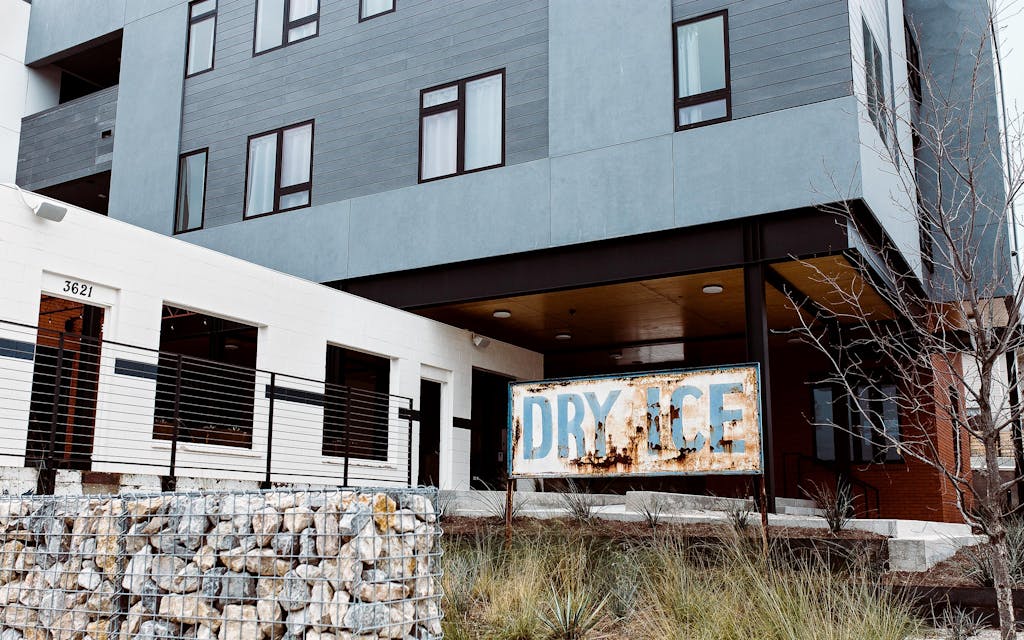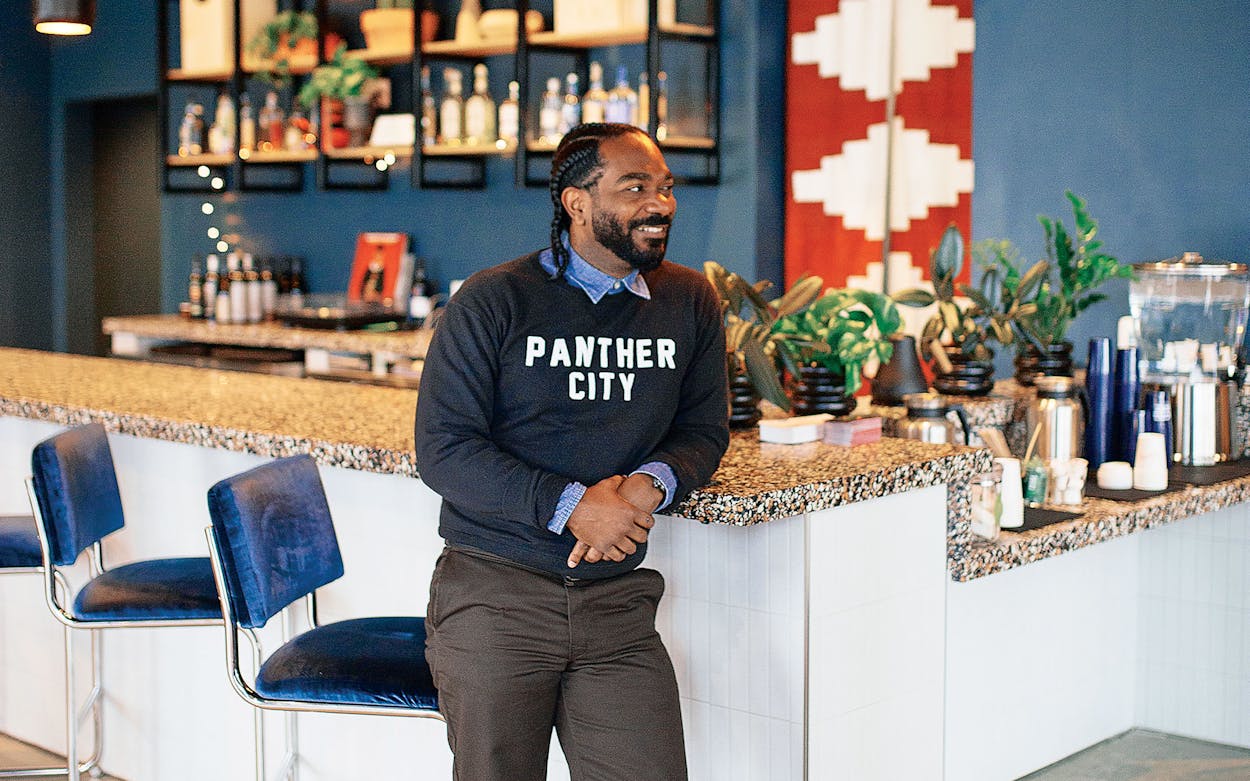Jonathan Morris remembers the first time he realized the importance of a hotel’s first impression. “I walked into the Ace in midtown Manhattan, and there was an energy in that space,” he says, recalling how locals and travelers alike gathered in its hip lobby bar as a deejay played music. “It was a scene, right?” To Morris, a Fort Worth entrepreneur, it felt like the real New York.
The 37-year-old Texan strove to create that same instant sense of place at Hotel Dryce, which he and co-owner Allen Mederos opened in August in Fort Worth’s Cultural District. In the Dryce lobby, furniture and throw rugs in shades of rust and gold warm up its dark blue walls and concrete floors while a smoky agave incense that Morris helped develop, Copal Cleanse, wafts through the air. On a winter afternoon, Morris settles into a sleek couch in the bar area, his forest-green Dickies jacket and matching pants elevating the workaday Fort Worth–based clothing line to a new level of cool. Although his employees also wear the label (the Dickies Arena is located just across the street), he has no formal affiliation with the company; he’s just been a fan since rapper Ice Cube donned the brand in the early nineties on MTV. Dickies, like Fort Worth, can be dressed up or down.
Morris nods at an album by jazz legend and Fort Worth native Ornette Coleman that’s on display near a turntable. Coleman, who died in 2015 at age 85, revolutionized jazz with his avant-garde style. But though he won a Pulitzer Prize and a Grammy Lifetime Achievement Award, no monuments to him exist in his hometown (although the long-gone Caravan of Dreams performing arts venue was opened in celebration of him in 1983). In a 2001 interview with Texas Monthly, Coleman recalled the city’s intense segregation during his childhood, which Morris’s family also endured. Morris, whose grandparents attended the same all-Black high school as Coleman—I.M. Terrell High, which closed in 1973—says that although Fort Worth has built its reputation around white cowboy culture, he’s determined to show a different side of the town’s rich traditions.


“The thing that is so ironic to me is that when you look at Ornette Coleman, his contribution in the arts and culture is more renowned internationally than it is right here in the city where he was born and lived as a young man,” Morris says. “I think in a lot of ways he was inspired by this city. This is a funky town—when you look at his development of free jazz, there’s a lot to be said for what Fort Worth is and how it played into his art.”
Innovation and improvisation play a role in Morris’s story too. He sees his hotel as a vehicle for introducing visitors to a new side of Cowtown, one filled with locally owned restaurants, bars, and stores. As the star of Self Employed, a Magnolia Network reality show about small-business owners, he’s become a popular ambassador for the city, which he refers to as Funky Town—a nickname derived from the eighties, when R&B and hip-hop radio hosts and artists referred to their town as “Funky Fort Worth.” (He’s also a fan of its other nickname, Panther City.)
Although his parents grew up in Fort Worth, Morris didn’t live in the city as a child. His father, Michael Morris, decided to uproot his growing family and move to San Antonio in 1984, the year Jonathan was born, to get away from his hometown’s “good old boys’ club” mentality. Because of his skin color, his father “just did not see Fort Worth as a welcoming place for his dreams,” Jonathan says. Michael, who became an executive at American Express Travel, later moved the family, including Jonathan’s two sisters and a brother, to Pflugerville before bringing them back to the DFW area fifteen years later, where he accepted a job as an adjunct political science professor at the University of Texas at Arlington. The Morrises settled in Corinth, near Denton.
Jonathan left Texas at eighteen to study business management at Morehouse College, in Atlanta. Living in a city where the population was more diverse (it’s roughly 50 percent Black, compared with about 18 percent in Fort Worth) was eye-opening. But he missed his high school girlfriend, Katherine Niederer, and moved to Fort Worth in 2008; they married four years later. He took a job with a digital marketing firm in Dallas and began commuting. But he soon felt the tug of entrepreneurship—a reconnection perhaps to his days of hawking handmade Chicago Bulls bookmarks in fourth grade and rhinestone bandannas in high school. “I wanted to do something more, but I had no clue what it was in that moment,” he remembers.

Inspiration finally struck in 2013 when his barber, who was located in Morris’s Dallas office building, announced he was raising his prices. Morris had watched the resurgence of old-school barber culture—featuring straight razors and hot shaves—in cities such as Austin, Los Angeles, and Portland, but the trend had yet to land in Fort Worth. Although he had no experience in the tonsorial arts, he sensed an opportunity and opened the Fort Worth Barber Shop in an old Arlington Heights garage.
Now eight years old, the shop attracts clients—from blue-collar workers to C-suite executives—seeking classic cuts, beard trims, or shaves. Its early success allowed Morris to leave his Dallas job behind. On a recent visit, he shakes hands with a few customers as they walk in and then takes a seat at the large community table in the mostly black-and-white space to quietly attend to business on his phone. From his carefully selected playlist (available on Spotify), hip-hop, bossa nova, Motown B sides, and Bob Dylan songs provide the soundtrack. Painted on the wall over the six barber stations is a quote from former Morehouse College president Benjamin E. Mays: “Whatever you do, strive to do it so well that no man living and no man dead and no man yet to be born could do it any better.”
In 2018 Morris began working with Mederos, a friend and real estate developer, to pursue his next dream: opening a hotel. Morris initially faced some opposition from the Arlington Heights Neighborhood Association when he sought rezoning of the area southwest of the newly built Dickies Arena. Residents pushed back on the boutique hotel plan, citing concerns about noise and increased crime. But eventually the project received overwhelming support, with dozens of friends and neighbors showing up to cheer on the project at a decisive city council vote in March 2019.
Constructed from the bones of a fifty-year-old dry-ice factory, from which the hotel gets its name, the three-story Dryce has just 21 rooms. Its design, by Bennett Partners, is industrial but warm; like the lobby, each room features concrete floors and sparse furnishings livened up with patterned textiles and artworks created through a grant project for local artists of color. Simple but thoughtful amenities include a glass of sparkling wine or a bottle of Lone Star at check-in, complimentary in-room pitchers of water, and a QR code to send Venmo tips to housekeeping.

The Dryce’s opening comes amid a $500 million-plus shine-up of the historic Stockyards—one of the city’s most popular tourist attractions—including the recent reimagining of Mule Alley, anchored by the new Hotel Drover. The lodging boom also includes the Sinclair and Kimpton Harper, both near Sundance Square. Longtime Fort Worth restaurateur and cheerleader Tim Love, who last summer opened the Hotel Otto and recently expanded his Stockyards empire with a new restaurant, the Tex-Mex–style Paloma Suerte, believes the city is ready to attract a different kind of visitor. “You’ve got to give variety,” he says. “People have got to feel like they’re going someplace special that’s not just barbecue or chicken-fried steak.”
The city is also taking steps toward acknowledging a more inclusive history. The National Juneteenth Museum is scheduled to open in 2023, inspired by 95-year-old Fort Worth resident Opal Lee, said to be the “grandmother of Juneteenth.” Lee, who was at President Biden’s side last year when he signed the proclamation recognizing June 19 as a holiday to commemorate the emancipation of enslaved people in the U.S., also attended I.M. Terrell. Additionally, city officials are discussing building an African American history or cultural museum.


About four years ago, Morris appeared in a promotional video for Visit Fort Worth to talk about the importance of diversity at his business. His on-screen charisma caught the attention of a local production company that was in talks with Waco home-improvement moguls Chip and Joanna Gaines, who were in the early stages of developing their Magnolia Network. Soon the concept for a show was born: Self Employed, in which Morris would talk to entrepreneurs about their dreams.
The first season of the eight-episode docuseries, which debuted when Magnolia launched, in July 2021, follows Morris as he interacts with small-business owners in Atlanta and Detroit as well as on his home turf. In the DFW area, he visits Val’s Cheesecakes, Odin Leather Goods, and Melt Ice Creams. Within the tight format of less than twenty minutes, Morris covers a lot of ground, listening to the founders’ stories and learning about their trade. At Odin, for instance, owner Odin Clack walks him through how to make a leather belt. While Clack recounts his journey and struggles, his eyes begin to water. “Do my kids know—I’m tearing up—they can start from nothing and they can grow something?” he says.
In another episode, Morris gathers with Fort Worth friends—including Esther Miller, of Gifted; chef Scotty Scott, of Cook Drank Eat; and Kari Crowe Seher, of Melt—on the rooftop of Tinie’s Mexican Cuisine. As the city’s skyline glows behind them, they enjoy tacos and margaritas while discussing the importance of being each other’s cheerleaders.
“I do think Fort Worth is ready for these new movers and shakers,” says Sarah Castillo, a native of the city’s Southside neighborhood, who owns Tinie’s as well as Taco Heads and Sidesaddle Saloon. She regards Morris as one of the biggest champions for small business in Fort Worth. “Every conversation I’ve ever had with him, you leave thinking in a different way,” she says. “He makes you think in a bigger picture.”
Back in the lobby of the Dryce, two oversized portraits by local artist Guillermo D. Tapia, of a Black man and a Black woman on horseback, represent a direct visual challenge to the typical Cowtown stereotypes. “I’ve hardly ever seen Black women represented in cowboy culture,” says Morris. Another Tapia photograph, a candid shot, shows a Black teenager with a megaphone at the West Seventh Street Bridge, an epicenter of the 2020 protests in the wake of George Floyd’s murder. “That represents a moment in our city. He’s got something to say,” says Morris of Tapia’s subject. Morris hopes he’s helped to make the space for him—and other locals—to say it.
This article originally appeared in the March 2022 issue of Texas Monthly with the headline “Checking in to Funky Town.” Subscribe today.
- More About:
- Where to Stay Now
- Hotels
- Fort Worth







